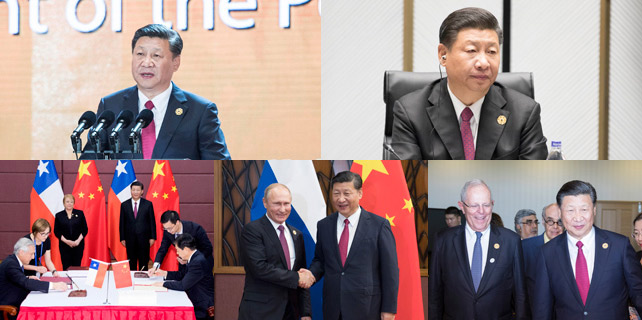A Chinese manufacturer's bittersweet bite of innovation
SHENYANG - If innovation can be compared to an apple, the latest bite taken by Shenyang Machine Tool Group, once the world's largest machine tool seller, was not the sweetest.
Although its self-developed smart factory machinery tools have created new demand, a lot more has to be done to steer the group towards a path of quality and sustainable development in the new era.
On the wall of one of the group's conference halls hangs a calligraphy showing four Chinese characters "da gan kuai shang," which means making all-out efforts and launch new projects as fast as possible.
"This calligraphy was painted around 2005. It reflects the history and changes our company has gone through over the past decade," said Gai Liya, manager of a production line producing smart factory machinery of the group's Shenzhen-listed branch, Shenyang Machine Tool Co, Ltd (SMTCL).
That was a time when the Chinese economy was growing at the fast pace of around 10 percent, fueling robust demand for manufacturing equipment.
The group's revenue surged from about 800 million yuan ($120 million) in 2002 to more than 10 billion yuan in 2007. In 2011, its revenue reached 18 billion yuan, the highest of all machinery tool producers worldwide
However, fast sales expansion doesn't necessarily mean high profit.
In 2011, SMTCL's profit attributable to shareholders was 104.77 million yuan, down 26 percent year on year, although its revenue surged 19.43 percent to 9.61 billion yuan.
The thin profit margin was to a large extent due to the complete reliance on expensive imports for the computerized control units - the heart of tools it produced.
Having long realized the problems in producing just low-value components, the group decided to develop the core technology itself and set up a research team in Shanghai as early as 2007.
The group began to market its self-developed i5 series of smart machinery tools with an internet-based control system in 2014. The name "i5" is short for industry, information, internet, intelligence and integration.
"Our i5 system was an important innovation and also a world-leading product," Ju Zhixin, head of the SMTCL smart manufacturing experience center.
Over the past few years, the i5 technology has reduced the company's costs and enabled a new model of profit sharing as all smart machinery tools can connect directly to the internet and function as a smart terminal, allowing real-time transmission of production data, Ju said.
More than 10,000 such smart products were sold by the end of last year. The company has also begun to build "smart manufacturing centers" around the country to profit from the actual time of using the tools.
China has announced a plan to develop advanced manufacturing and promote further integration of the internet, big data and artificial intelligence with the real economy.
The group's new model is a perfect example of such a direction.
China's economy has been transitioning from a phase of rapid growth to a stage of high-quality development, which requires the innovation capacity and competitiveness of the economy.
However, it has not been plain sailing for SMTCL. The company has reported losses for more than two years. It forecast that the loss in the first nine months of this year will be between 750 million and 800 million yuan, compared with a loss of 798 million yuan for the same period of 2016.
Product sales dropped due to insufficient downstream demand affected by macroeconomic and industry environment.
The losses in recent years came as China's economic growth slowed to medium-high rates and the share of the service sector in GDP has exceeded that of the industrial sector.
However, Gai is still confident about future growth, saying that the independent technology allows them to tap new markets at lower costs. "Our feeling is that there is nothing we cannot achieve with our strength."
"Technological innovation should be a lasting process. We still need to make constant experiments and huge inputs in the future," according to Ju.









